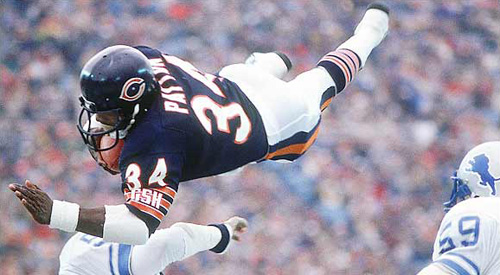
Sweetness: The Enigmatic Life of Walter Payton (2011)
Rating: 8/10
I bought Jeff Pearlman’s “Sweetness: The Enigmatic Life of Walter Payton” last October, not long after Sports Illustrated had published this excerpt of the book – which had created a little buzz for the book and tested the theory that the only bad press is no press. (But I’ll bet that if you asked Pearlman himself, he would probably say that while this may be true, it’s also true that for the most part the only good press is, well, good press.)
Just like that, it was strike one on a very good biography – because yes, I have finally read the book. I loved it, but more on that shortly. The whole book was judged unfairly on that short excerpt, and fittingly a biography of one of the most underappreciated superstars in NFL history was underappreciated. You can’t make this up.
I love the NFL. I even collect NFL jerseys. But even when I visited Chicago in late 2006, I didn’t buy a Walter Payton Bears jersey, partly because I would see one of a player that I preferred to Payton – Barry Sanders, for example. And that’s precisely the point. With Payton, there always seemed to be another running back who was better, faster, or stronger – even where there wasn’t.
“Sweetness” tells of the “enigmatic life” of Walter Payton, ex-leading rusher in the history of the NFL. Payton, the football player, is as accomplished as any other in NFL history. When he retired in 1988, he was the NFL’s all-time leading rusher with 16,726 yards, had won Super Bowl XX and later, the NFL would give his name to its annual Man of the Year award. At one point, he held the records for most career touchdowns, carries, yards from scrimmage and all-purpose yards to go along with those 16,726 rushing yards. Yet, only 11 years after his retirement, Payton was dead at age 45.
[php snippet=1]
And therein lays “Sweetness”’s problem – Payton is dead, and some believe we should let him rest in peace. But in Pearlman’s defense, there’s no reason to think that if Payton were alive, he wouldn’t have been the 679th person interviewed as part of his research for the book.
Pearlman is a gifted journalist and no stranger to controversies. Readers remember him from “Boys Will Be Boys,” “The Rocket That Fell to Earth” or “Love Me, Hate Me.” Just don’t ask John Rocker about him, although this might be more telling of Rocker than it is of Pearlman. By all indications Pearlman has done his homework for “Sweetness” (i.e. 678 interviews) and isn’t looking to tell his own version of the Walter Payton story. He tells the Walter Payton story as he’s discovered it, from his youth in Columbia, Miss., to his college days at Jackson State, to his career with the Chicago Bears and, finally, the 11 years after his retirement. The highlight of the book is easily the lowlight of Payton’s life in 1999 as he’s about to die. Pearlman reconstructs Payton’s last days, and it is devastating and breathtaking.
Pearlman is a gifted journalist and no stranger to controversies. Readers remember him from “Boys Will Be Boys,” “The Rocket That Fell to Earth” or “Love Me, Hate Me.” Just don’t ask John Rocker about him, although this might be more telling of Rocker than it is of Pearlman. By all indications Pearlman has done his homework for “Sweetness” (i.e. 678 interviews) and isn’t looking to tell his own version of the Walter Payton story. He tells the Walter Payton story as he’s discovered it, from his youth in Columbia, Miss., to his college days at Jackson State, to his career with the Chicago Bears and, finally, the 11 years after his retirement. The highlight of the book is easily the lowlight of Payton’s life in 1999 as he’s about to die. Pearlman reconstructs Payton’s last days, and it is devastating and breathtaking.
While alive, Payton’s smile is what jumped to mind but behind the smile of Payton, there was suffering. In his last years, there was a man slowly dying of primary sclerosing cholangitis and bile duct cancer, but the suffering had started long before.
Behind the smile, there was a man eager to please and distraught at the prospect of disappointing. The running back was the ultimate team player who would sulk when he didn’t get as many carries as he thought he should have had or the Super Bowl rushing touchdown that went to William Perry instead. Payton was praised for his embracing of marginal teammates and for going out of his way to reach out to fans, especially young or sick ones. Yet he didn’t reconnect with teammate Mike Singletary until his last few days alive, presumably because Singletary was one to confront Payton about his womanizing ways.
Yep, Connie Payton might have followed Payton to Chicago, eventually marrying him, but she seemed to be his partner only in name, as Walter never said no to a pretty blond. Payton was an absentee father at best to his and Connie’s two children, Jarrett and Brittney. But both had it better than his illegitimate son, Nigel, who never met his father and who remains estranged from the Connie Payton side of his family. Throughout Walter’s life, it seems like his weakness was his sweetness – just like he once told Ohio State cornerback Neal Colzie.
“Sweetness” changes the image of Walter Payton, the man. The book makes him more human, more common, more flawed – just like you, just like me, and everybody else. Yet, no one likes a superstar who’s really just gifted at his sport, but otherwise is like all of us. Where’s the fun in that?
[php snippet=1] http://credit-n.ru/zaymyi-next.html http://credit-n.ru/zaymyi-next.html http://www.otc-certified-store.com/muscle-relaxants-medicine-usa.html www.zp-pdl.com

